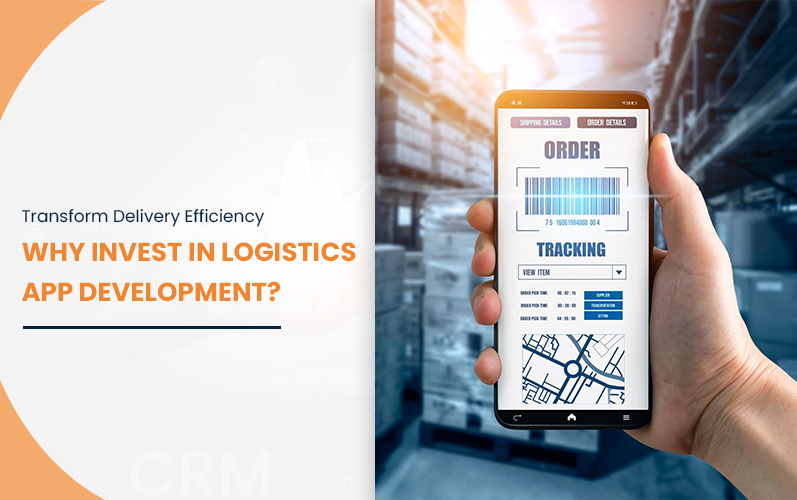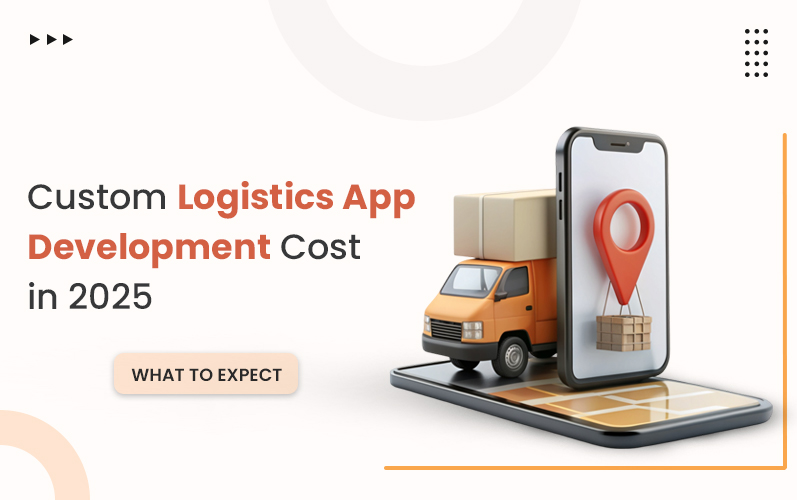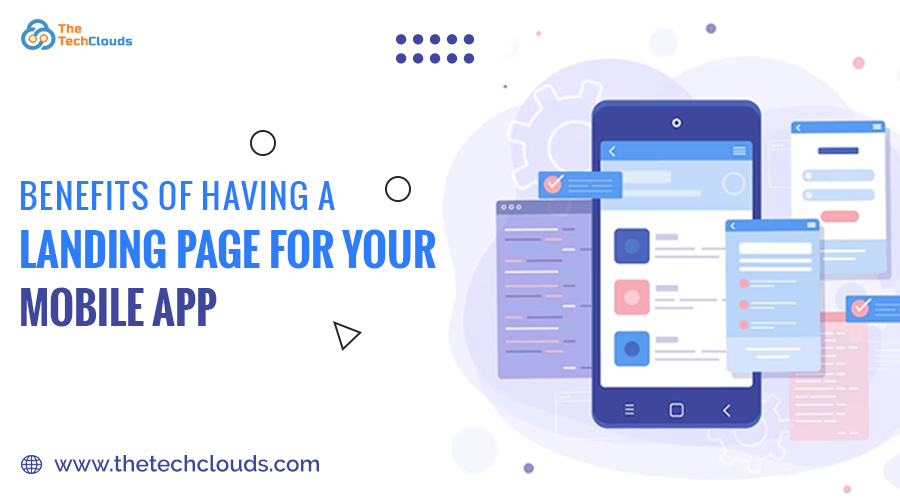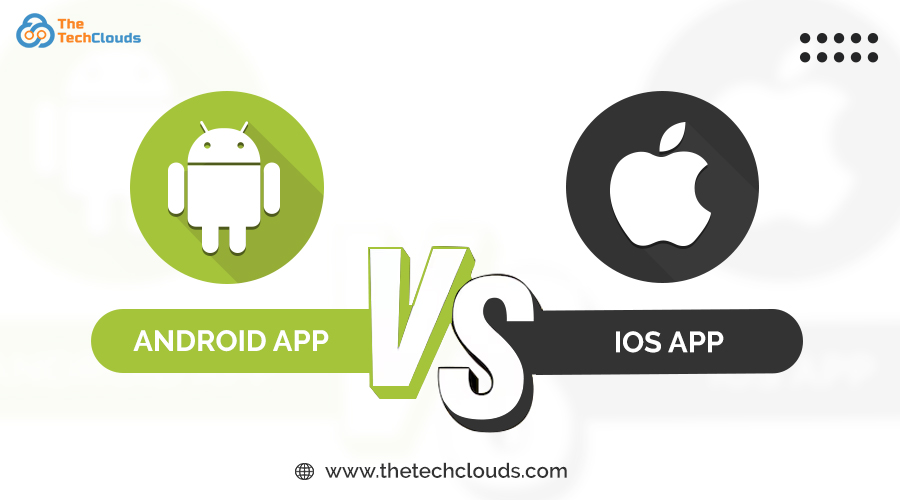A substantial change has been observed in today’s rapidly evolving business world. But due to the advancement of technology, logistics applications are gaining ground to simplify operations, augment visibility, and improve customer satisfaction. It is expected that by 2028, the logistics industry scale is projected to exceed 14.08 trillion U.S dollars (Source).
Logistics companies make use of mobile applications due to the rise of e-commerce platforms and escalating complications of supply chains. By implementing strategic plans and technological investments, logistic firms can improve their productivity by up to 80%. Moreover, companies are espousing ingenuous Logistic Application Solutions, to mitigate the issues of supply chains and shipping operations. Custom logistics application development refers to the creation of certain software solutions that can sort out transport management problems and make cutting-edge supply chain applications more pertinent for businesses to boost their performance.
Logistics App- A Comprehensive Explanation
Logistics app is either a mobile-based application or a web-based application. These apps are integrated with different processes that can handle logistics and supply chain issues effectively. These guarantee that the effective resource is utilized in an effective way and the establishment of smooth communication among various teams who are involved in logistics operations.
Logistics applications incorporate some specific tools that are employed to magnify conveyance-related operations, warehouse management, and diminish physical labor. These apps are conducive to providing transparency into the shipping process, minimizing the wariness of the clients, and averting misunderstandings between various parties involved in the transportation-related process.
What is Logistics App Development?
Logistics applications are convenient tools designed to optimize transportation-related operations and storage of goods and streamline and automate earlier manually completed tasks. Additionally, these apps provide greater transparency into the shipping process, decreasing client mistrust and miscommunications between the various parties.
While commonly associated with transportation and logistics firms, a wide range of businesses can benefit from building an app tailored to manage logistics processes. The following are prime sectors that can gain substantial advantages through mobile app development focused on logistics optimization:
Manufacturing
Manufacturing firms can boost productivity by adopting logistics applications. A straightforward digital transport system helps enhance logistics flow, enabling real-time inventory tracking, minimizing overstock and shortages, and aligning production schedules with streamlined delivery operations.
Transportation and Freight
Transportation and freight companies are at the core of logistics innovation. Through custom logistics app development, these businesses can enhance route planning, optimize delivery timelines, improve fuel efficiency, and automate shipment data processing to reduce manual errors.
Agriculture
In agriculture, delivering fresh produce quickly and efficiently is crucial for profitability. Logistics apps help reduce waste via automated inventory control, shorten the time from harvest to market, and ensure the preservation of perishable goods through optimized delivery scheduling.
Retail and E-commerce
Retailers and online sellers benefit greatly from custom logistics app development. These apps assist in real-time warehouse inventory tracking, full-cycle order management, and last-mile route optimization to improve customer satisfaction and delivery efficiency.
Food Industry
The food sector relies heavily on reliable logistics to distribute fresh products globally. Logistics apps help businesses manage perishable inventory, optimize distribution routes, and ensure food safety and freshness throughout the entire delivery process.
Why Businesses Are Investing in Logistics App Solutions
A growing number of businesses across industries are investing in logistics apps and it’s no coincidence. Advancements in technology, rising customer expectations, the demand for greater operational efficiency, and the need for supply chain transparency have all contributed to this accelerating trend. Below are the key factors driving the surge in interest.
1. Rise of E-Commerce
The surge in online shopping has amplified the need for better delivery systems. A logistics app simplifies complex operations, streamlines order fulfillment, and helps meet fast delivery expectations like same-day or next-day shipping to keep up with customer demands.
2. Demand for Real-Time Visibility
Customers want instant updates on shipment progress. Logistics applications offer real-time tracking, enhancing operational transparency. Businesses and clients gain confidence through constant updates on goods' location and status, promoting trust and smoother supply chain coordination.
3. Adoption of Emerging Technologies
Modern logistics systems now incorporate IoT, sensors, and GPS to provide data on goods in transit. Custom logistics app development makes it possible to integrate these technologies, ensuring smarter route management and reducing manual errors for more efficient delivery performance.
4. Efficient Routing and Live Tracking
Apps must offer reliable routing that avoids traffic and updates drivers in real time. Real-time tracking features let shippers and customers monitor cargo, containers, and delivery vehicles, ensuring better oversight and improving logistics efficiency.
5. Inbound and Outbound Visualization
Clear visual tracking of incoming and outgoing goods helps receivers and shippers monitor movement effectively. This visibility enhances accuracy and coordination within operations, improving time management and reducing unnecessary communication delays.
6. Automated Document Management
Automation in documentation allows stakeholders to securely share, store, and manage shipping-related files. This boosts efficiency, reduces errors, and cuts processing time by eliminating traditional paperwork and streamlining documentation across the entire logistics process.
7. Flexible Pricing Options
Apps with dynamic pricing features help users compare carrier rates and choose cost-effective options. This increases competitiveness and ensures that companies always receive fair market value for transport and delivery services.
8. Smart Alerts and Notifications
Notifications alert users instantly of any changes to delivery status. This helps avoid delays and miscommunication, ensuring each shipment remains on schedule and all involved parties are updated promptly throughout the supply chain journey.
9. Cross-Platform Integration
A robust website development services strategy allows logistics apps to connect with CRM, customer support, and accounting tools. This creates a unified platform for businesses to manage client interactions, shipments, and finances more efficiently.
10. International Shipping Support
To serve global markets, apps must support international tracking, customs documentation, and tax management. These features simplify cross-border logistics, making it easier for businesses to expand and manage shipments worldwide without delays or compliance issues.
11. Data Analytics and Forecasting
Apps using AI and machine learning can analyze large logistics datasets, helping businesses anticipate demand, optimize routes, and improve decision-making. This strengthens performance and maximizes the strategic value of logistics operations for companies.
12. Global Supply Chain Complexity
Expanding trade has complicated international supply chains. A well-designed logistics app helps manage global shipping, logistics, customs processes, and communication between worldwide suppliers, carriers, and customers, ensuring smoother global trade operations and better responsiveness.
Final Statement
Modern business world face tremendous pressure in managing logistics operations and supply chains which negatively impacts the customer expectations and cost reduction. Investing in Logistics Application Solutions empowers companies to manage shipments efficiently, monitor operations in real time, and improve overall service delivery. These apps support smarter decision-making and operational control. With the help of expertise like The Tech Clouds (TTC), businesses can revolutionize their logistics processes for long-term success. Selecting the right development partner is the key to unlocking the logistics potential of a business.
Contact TTC Soon and Exceed Logistics Standards Beyond Expectations!







